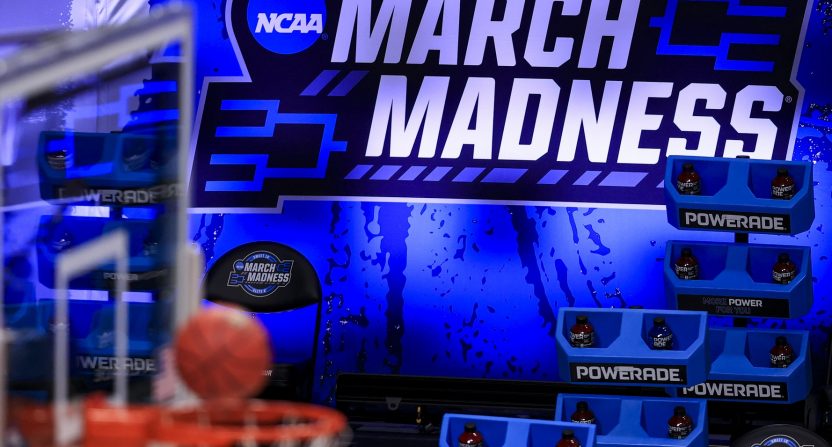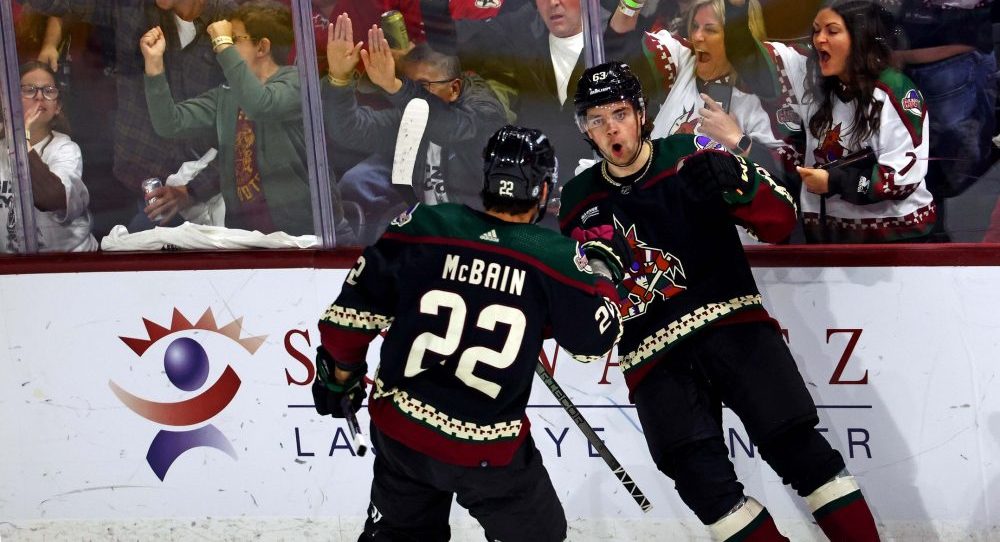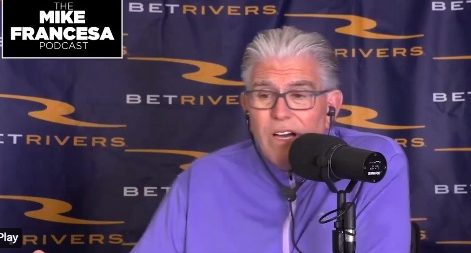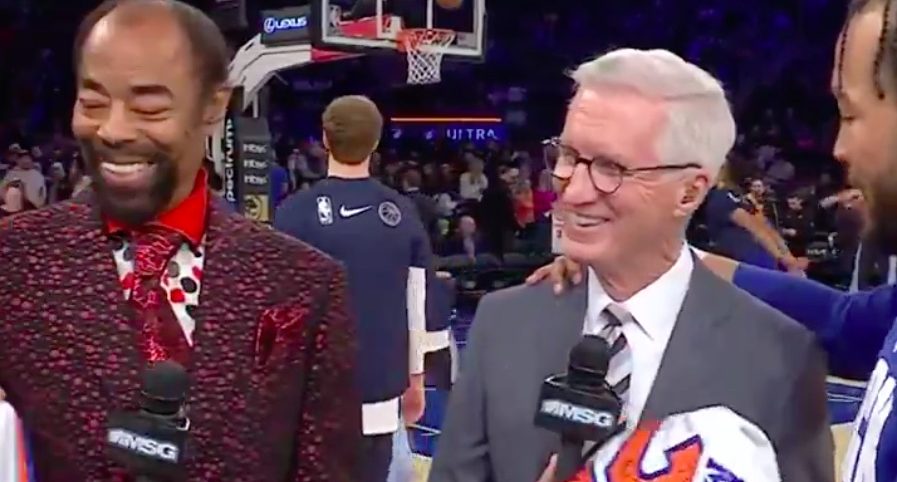After a year off, the NCAA Tournament is back, and so are our NCAA Tournament broadcaster rankings.
This year, we got over 16,000 votes, and all but one of the ten broadcast teams received at least 1,500 votes (so sorry, Brad Nessler and Steve Lavin). The average score was a stout 2.82, no team scored under a 2.00, and we had a shocking three teams break the 3.50 mark (which is usually more than enough to claim the top spot in our broadcaster rankings). Many of the broadcast teams for this year’s tournament were new, with only two of the ten teams that called the first two rounds of games remaining unchanged from 2019, but the overall rankings will seem quite familiar from recent years, analyst changes aside.
Previous rankings: 2014, 2015, 2016, 2018, 2019
Click here for full vote totals and percentages.
10. Lisa Byington and Steve Smith – 2.04
Most common grade: C (27.16% of votes)
Previous scores: N/A (Smith scored a 2.74 in 2015 and a 2.89 in 2016 with Brian Anderson, and a 2.54 in 2018 and a 2.61 in 2019 with Spero Dedes and Len Elmore)
Previous rankings: N/A (Smith ranked 4th of 8 in 2015 and 5th of 8 in 2016 with Brian Anderson, and 6th of 8 in both 2018 and 2019 with Spero Dedes and Len Elmore
Notes: The score seems a bit harsh to me, but given the strength of the other crews on this year’s tournament, the ranking is probably right. Byington has become a BTN play by play fixture over the last couple of years, and I personally think she’s settled in nicely. While our readers didn’t rate the pairing of her and Smith all that highly, this wasn’t a long-established team, and they did fine under the circumstances in this year’s tournament.
9. Carter Blackburn and Debbie Antonelli – 2.08
Most common grade: C (38.08% of votes)
Previous scores: 1.84 (2018), 1.93 (2019), while Blackburn also scored a 2.15 in 2016 with Mike Gminski
Previous rankings: 8 of 8 (2018, 2019), while Blackburn also ranked 6th of 8 in 2016 with Mike Gminski
Notes: I don’t have a whole lot to say here. This was the third straight tournament that this team worked together as a pair, and the fourth straight if you count their trio with Mike Gminski in 2017. They pulled their highest score this year, so maybe things are looking up.
8. Tom McCarthy and Avery Johnson – 2.41
Most common grade: B (33.49% of votes)
Previous scores: N/A
Previous rankings: N/A
Notes: As someone who has heard a whole lot of McCarthy thanks to my previous home in Pennsylvania, basketball is his best sport, and he proved it during this tournament. As for Johnson, he’s very much cut from the Aqib Talib mold as a broadcaster: incredibly enthusiastic and knowledgeable, though lacking some polish. This seemed like something of a last minute addition to the lineup due to the need for ten teams rather than eight, but they did a fine job under the circumstances.
7. Spero Dedes and Brendan Haywood – 2.45
Most common grade: B (35.75% of votes)
Previous scores: N/A (Dedes scored a 2.33 in 2015 with Mike Gminski, a 1.94 in 2016 with Doug Gottlieb, and a 2.54 in 2018 and a 2.61 in 2019 with Steve Smith and Len Elmore)
Previous rankings: N/A (Dedes ranked 7th of 8 in 2015 with Mike Gminski, 8th of 8 in 2016 with Doug Gottlieb, and 6th of 8 in both 2018 and 2019 with Steve Smith and Len Elmore)
Notes: I appreciated Haywood’s addition to the tournament this year, working alongside an established voice in Dedes. He’s still got plenty of room to grow as a broadcaster, and he’s come a long way from his debut as an analyst on the UNC Team Stream broadcasts back in 2016.
6. Andrew Catalon and Steve Lappas – 2.60
Most common grade: B (37.17% of votes)
Previous scores: 2.27 (2015), 2.12 (2016), 2.20 (2018), 2.31 (2019)
Previous rankings: 8 of 8 (2015), 7 of 8 (2016, 2018, 2019)
Notes: These guys have worked together calling the tournament for years, and at this point, we know what we’re getting. Catalon is a solid hand in the play by play role, and while Lappas can be…well, a bit much at times, he clearly knows the game and puts his all into his work. I wouldn’t say that I love their work, but they’re perfectly acceptable for a first weekend team.
5. Brian Anderson and Jim Jackson – 2.84
Most common grade: B (41.06% of votes)
Previous scores: N/A (Anderson scored a 2.74 in 2015 and a 2.89 in 2016 with Steve Smith, and a 2.66 in 2018 and a 2.90 in 2019 with Chris Webber)
Previous rankings: N/A (Anderson ranked 4th of 8 in 2015 and 5th of 8 in 2016 with Steve Smith, and 5th of 8 in both 2018 and 2019 with Chris Webber)
Notes: I don’t think it’s a very hot take to say that I prefer Anderson’s baseball work to his basketball work, but he’s continually improving as a basketball broadcaster. Jackson is a guy who I’ve grown to like through his work at Fox, and he makes a good pairing with Anderson. Here’s hoping they return for another tournament together in 2022.
4. Brad Nessler and Steve Lavin – 3.04
Most common grade: B (45.97% of votes)
Previous scores: 3.08 (2018), 2.95 (2019, with Jim Jackson)
Previous rankings: 4th of 8 (2018, 2019 with Jim Jackson)
Notes: I think this might be the most underrated broadcast team in the tournament each year. Nessler is an absolute pro, and I still think his hire by CBS remains one of the more underrated sports media moves of the last few years. As for Lavin, I’ve been a big fan of his work in both studio and game settings since he re-joined the broadcasting world after his time at St. John’s, and him and Nessler work well together. It’s a shame this is only a team for the first two rounds.
3. Jim Nantz and Bill Raftery – 3.50
Most common grade: A (67.41% of votes)
Previous scores: 3.21 (2015, with Grant Hill), 3.18 (2016, with Grant Hill), 3.34 (2018, with Grant Hill), 3.36 (2019, with Grant Hill)
Previous rankings: 2nd of 8 (2015, 2016, and 2019, with Grant Hill), 3rd of 8 (2018, with Grant Hill)
Notes: Addition by subtraction? Grant Hill’s shift out of this booth for the first two rounds paid dividends (as you’ll see later in these rankings), and Raftery made the most with less verbal traffic on the broadcast. Once we got to the second weekend with Hill rejoining the team, the broadcast was still quite good, but was just a bit more cluttered and didn’t flow as well.
2. Kevin Harlan and Dan Bonner – 3.61
Most common grade: A (70.32% of votes)
Previous scores: 2.95 (2015, with Reggie Miller), 3.01 (2016, with Reggie Miller), 3.41 (2018, with Reggie Miller), 3.36 (2019, with Reggie Miller)
Previous rankings: 3rd of 8 (2015 and 2019, with Reggie Miller), 4th of 8 (2016, with Reggie Miller) 2nd of 8 (2018, with Reggie Miller)
Notes: Without Reggie Miller in the booth this year, Harlan and Bonner shined, playing off each other quite well. One less analyst let Bonner’s analysis stand on its own and also allowed for more interplay between the two broadcasters. I have no idea if CBS and Turner are going to revert to their commentary teams with NBA analysts next spring, but if they do, the two networks should let Harlan and Bonner work together in peace.
1. Ian Eagle and Grant Hill – 3.68
Most common grade: A (75.79% of votes)
Previous scores: N/A (Eagle scored a 2.50 in 2015 with Doug Gottlieb, a 3.01 in 2016 with Chris Webber and Len Elmore, and a 3.56 in 2018 and a 3.57 in 2019 with Jim Spanarkel, while Hill scored a 3.21 in 2015, a 3.18 in 2016, a 3.34 in 2018, and a 3.36 in 2019, all with Jim Nantz and Bill Raftery)
Previous rankings: N/A (Eagle ranked 6th of 8 in 2015 with Doug Gottlieb, 3rd of 8 in 2016 with Chris Webber and Len Elmore, and 1st of 8 in both 2018 and 2019 with Jim Spanarkel, while Hill ranked 2nd of 8 in 2015, 2016, and 2019 and 3rd of 8 in 2018, all with Jim Nantz and Bill Raftery)
Notes: CBS and Turner may have found the magic formula with Eagle and Hill, though it’s been great hearing Eagle working with Jim Spanarkel again over the last few days. Broken out of the trio he was in with Nantz and Raftery, Hill was able to shine in the first two rounds before being moved back into his long-time booth this week. Eagle’s NCAA Tournament broadcast teams prior to his partnership with Spanarkel show that he doesn’t have that kind of chemistry with everyone, but in Hill, he may have found a partner that is a more than adequate stand-in.






